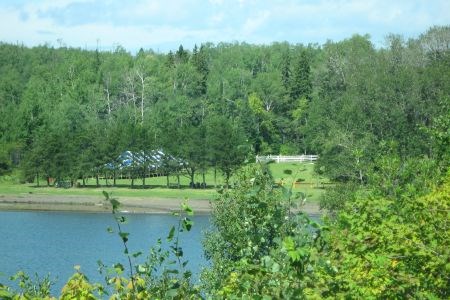Some days Jean Paul (J.P.) Gladu rolls out of bed and wonders what he's gotten himself into.
The senior business development advisor for the Bingwi Neyaashi Anishinaabek is helping to spearhead the revival of a former Ojibway First Nation community on the shores of Lake Nipigon.
“It's a ton of opportunity,” said Gladu, a trained forester. “It's also a little overwhelming. Some mornings I wake up and wonder how the hell are we going to get this all done?”
The northwestern Ontario community, which only received official reserve status from Ottawa two years ago, is establishing itself around the construction of a value-added sawmill and wood pellet mill.
Helping to map out the town site and work out the business arrangements means frequent commutes back to Thunder Bay for Gladu to confer with his development board.
It's a staggering amount of work, but Gladu comes at it with good credentials. Armed with a Queen's University MBA, he wears many leadership hats with organizations dedicated to national and local Aboriginal strategy, bioenergy, forestry and development organizations, including president of the Papasay Management Corporation.
Building Bingwi Neyaashi Anishinaabek, also known as Sand Point First Nation, is a personal mission for Gladu who is linked to the community through his family and ancestral links. His father, Paul Gladu, is the chief.
Residents of Sand Point have spent a good chunk of their community's history without a home.
Sand Point was left out of the 1850 signing of the Robinson Superior Treaty. Over time, some bands received reserves. Others disappeared and the residents left.
“Communities like ours never really officially got a reserve,” said Gladu.
The federal government allowed residents to stay through an occupancy licence with the Ontario government, but the province essentially owned the land.
That was bad news for locals in the 1950s, when Ontario decided to expropriate the land on the beautiful southeast corner of Lake Nipigon to establish a provincial park.
The community was demolished and some buildings were moved to neighbouring reserves. A 1999 forest fire that swept through the area resulted in the park's decommissioning. After years in the courts, the band regained reserve status in April 2010.
Faced with limited infrastructure, Gladu is part of a master planning team that is drawing up space for more than 100 on-reserve members. Only a handful of members live there during the warm months.
There are some roads and electricity connections, but there are no water and sewer connections.
An industrial park is being planned around the mills with room set aside for expansion and leasing opportunities.
A $5.3-million sawmill is under construction and should be operational by fall.
With a $1-million grant from the Northern Ontario Heritage Fund and $460,000 from FedNor, the value-added cedar plant will be making pallets for a largely regional market in the Thunder Bay area and northern Minnesota.
The two-shift operation, which will employ 22 full-timers, has a 15,000-cubic-metre wood allocation.
Last spring, the band's proposed pellet mill was awarded an annual Crown wood allocation of 113,000 cubic metres of poplar and white birch by the province.
The $15-million project will create 31 full-time jobs. Construction starts this spring with operations commencing early next year.
A proposed one-megawatt biomass co-generation plant will provide heat and power to the two mills and to the community.
Coming to the table with the technology, training and customers are Thunder Bay businessmen Ed Fukushima and Larry Levchak, owners of an Atikokan wood pellet mill which will start up this summer.
The pair have larger plans for multiple pellets mills across northwestern Ontario through a spinoff company, Great North Bio Energy.
Besides working with Sand Point, they are teaming up with the Whitesand First Nation, near Armstrong, for a $25-million pellet plant and co-generation facility there.
Both pellet mills are in the engineering and environmental assessment stage.
“The intent is for their people to run the plants,” said Fukushima. Atikokan would become a training ground because the machinery at all the sites would be identical.
“All the spare parts would be in northwestern Ontario, an associated company – Automation Now – will be doing all the software. The whole process – machinery, software, all the controls, maintenance – would be regional.”
“We're all operating from the same model,” adds Gladu, “same technology, training, process and product.”
Fukushima is lining up European customers to market and manufacture a combined 300,000 tonnes annually of pellets from the three plants.
“We need to get our off-take agreement and our financing done,” said Gladu.
Once the detailed engineering is done in April, Gladu said there will be an “aggressive timeline” in mill construction and training toward the start of operations next spring.




